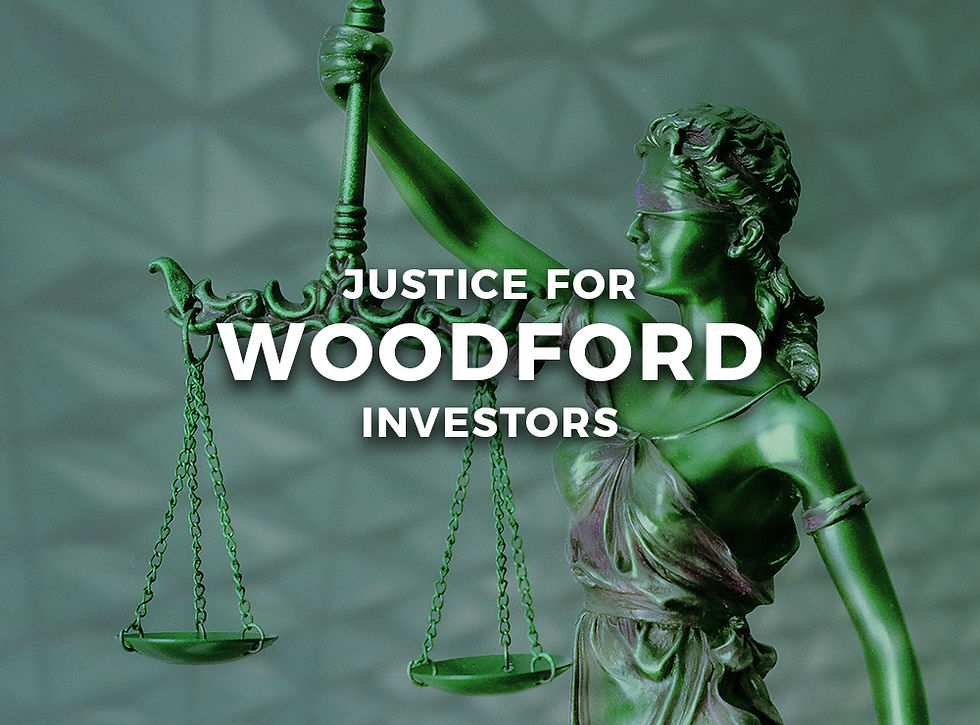How "Britain's Buffett" lost the plot
- Robin Powell

- Dec 31, 2020
- 4 min read
Updated: Nov 29, 2024

By ROBIN POWELL
It’s a question that’s confounded investment commentators for the last year and a half: How did Neil Woodford, the fund manager once dubbed Britain’s Warren Buffett, come to suffer such a spectacular fall from grace?
Perhaps, in 2021, we will finally have a clearer picture of exactly why his multi-billion-pound investment empire collapsed so catastrophically.
For a start, there are several legal actions on behalf of Woodford investors in the pipeline. The long-awaited report by the Financial Conduct Authority surely can’t be too far off. And, finally, two new books on the scandal are about to be published.
I read the first of those books — by journalist David Ricketts — over the holiday period. It’s well worth reading, and I don’t want to give too much away about its contents. But what strikes you most is quite how far Woodford had strayed beyond his circle of competence. It should have been obvious that his funds were heading for serious trouble. The question is, why did those with the power to intervene appear to do nothing to prevent it?
Woodford built his reputation at Invesco Perpetual by picking growth stocks. He famously favoured safer, traditional stocks such as tobacco companies. In particular he made two big, correct calls. First, he avoided tech stocks in the dotcom boom of the late 1990s; secondly he shunned banks in the run-up to the global financial crisis in 2008-9.
Investors who trusted him and kept their nerve were richly rewarded.
But, as Ricketts explains, Woodford started sowing the seeds of his eventual downfall before he left Invesco. The book describes how, in the latter stages of his career there, Woodford developed an appetite for smaller companies. Concerned about the risk he was taking on, the company set up a formal risk management group to keep a closer eye on what he was doing.
The FCA also took notice of Woodford’s change of direction and launched its own investigation. Between May 2008 and November 2012, the regulator found that investors in 15 Invesco funds had been exposed to higher levels of risk than they had been led to expect on 33 different occasions.
By the time that report was published, Neil Woodford had already announced his decision to leave Invesco and set up Woodford Investment Management. There, Woodford’s interest in small, early-stage companies was evident from the outset. His new flagship Equity Income fund included several stocks listed on the Alternative Investment Market, or AIM.
“The big issue was the nature of the positions,” a former colleague is quoted as saying. “You would not expect a fund with ‘income’ in the name to have such a large percentage in biotech and healthcare stocks, most of which have no yield whatsoever.
“Investors stuck by him in the belief that he had been through tough periods before and would bounce back. But they didn't appreciate what they were invested in was different from the Woodford of old.”
Ricketts cites several examples of companies that Woodford invested in which should have set the alarm bells ringing. The most obvious example is a North Carolina company called Industrial Heat, which had a licence agreement with an Italian entrepreneur and inventor by the name of Andrea Rossi. Woodford invested more than £50 million of his investors’ money in the company.
Rossi, who it later emerged had been convicted of financial fraud and twice served time in prison, claimed to have developed a commercially viable “cold fusion” device. But it didn't work and, after a protracted legal dispute, Rossi and Industrial Heat went their separate ways, and investors suffered significant losses.
How, then, did a supposedly savvy fund manager invest in so many firms that failed to deliver healthy profits, if any at all?
provides some clues. It quotes another Woodford insider as saying there was a lack of due diligence performed on some of the early-stage companies who approached Woodford for investment.
“Successful private equity people or venture capitalists will tell you they have a process to weed out people,” the former colleague says. "The pitches might be polished, but you have to pick it apart and kick the wheels. Documents were very much taken at face value.”
None of this will come as welcome news to Woodford investors. But it should give them encouragement that their case for compensation is strong.
Ultimately, it was Link Fund Solutions, Woodford’s Authorised Corporate Director, or ACD, which was responsible for ensuring that investors’ money was being judiciously invested, and that those investors could redeem their shares on request.
Link clearly failed in its duty to give investors access to their money when they wanted it. And it’s hard to argue that investing in firms like Industrial Heat was a sensible use of their money.
As part of our campaign #JusticeForWoodfordInvestors, The Evidence-Based Investor is joining forces with the London-based law firm Harcus Parker, which will shortly be lodging a collective claim against Link Fund Solutions.
I am neither a lawyer nor a financial adviser, but I do believe that the case against Link is robust, and that Harcus Parker’s action has a good chance of succeeding.
If you would like find out more about joining the claim, go to WoodfordClaim.com.
ROBIN POWELL is the founding editor of The Evidence-Based Investor. He works as a journalist and consultant specialising in finance and investing, and as a campaigner for a fairer, more transparent asset management industry. He is the founder of Ember Television and Regis Media. You can find him here on LinkedIn and Twitter.
© The Evidence-Based Investor MMXXIV. All rights reserved. Unauthorised use and/ or duplication of this material without express and written permission is strictly prohibited.



